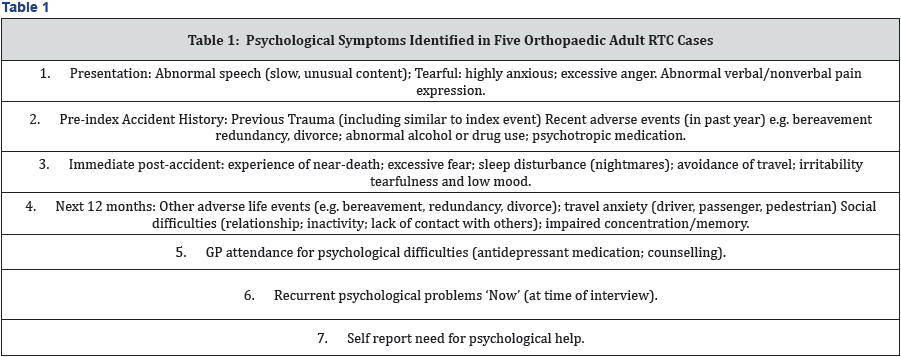Juniper Publishers- Open Access Journal of Case Studies
Clarification of Psychological Symptoms by Orthopaedic Expert Witness: Outcome of Ten Cases
Authored by Koch HCH
Abstract
The orthopaedic expert witness is frequently faced with one or more psychological symptoms during a typical personal injury interview. This paper describes the common psychological symptoms presented by either adults or children. It highlights the benefits arising from an early recommendation in the orthopaedic report for a further report from a psychologist.
Introduction
Providing an Orthopaedic opinion as an expert witness in a civil claim is a complex role. Notwithstanding the myriad of physical factors that need to be considered with the appropriate supporting records and scans, the orthopaedic expert will also be cognizant of other symptoms, including psychological and social signs. Although these will be largely outside his/ her competence and training, orthopaedics expert will be minded to make reference to these if only to recommend a full, comprehensive psychological assessment be commissioned.
This paper illustrates the types of symptoms to consider including in the general questioning of a claimant in a personal injury case for a road traffic collision (RTC).
Short Communication
The first author reviewed the most recent ten cases he had assessed in his medico-legal orthopaedic clinic to identify the several psychological symptoms which required mentioning.


(Table 1 & 2) below indicate the commonest type of psychological symptoms that the orthopaedic expert is likely hear or elicit during the orthopaedic assessment.
- Early psychological assessment.
- Early advice or treatment recommendation.
- As a result of [1,2] the prognosis can improve i.e. shorter duration of symptoms; less entrenched or habitual behaviours (e.g. travel avoidance).
- Reduction of work - related disability due to psychological factors.
One additional area worthy of mention is that of chronic pain. The orthopaedic expert may identify non-verbal, verbal and motivational issues in relation to the claimant’s chronic pain. He may/may not diagnosis an orthopaedic/physical disorder but the accompanying functional overlay may will point to a pain disorder/somatic symptom disorder with associated psychological factors and hence a further report from a psychologist with a special interest in chronic pain can be recommended.
In each particular legal case, a lawyer and administrator, plus a medical advisor if available, would review the orthopaedic expert’s comments and decide if the recommendation for a further psychological/psychiatric assessment was appropriate and warranted. Typically, a recommendation of this type would be accepted and expedited.
Conclusion
This short paper should be of interest to all orthopaedic expert witnesses and highlights the types of psychological symptoms or behaviours that will be beneficial to note and flag up in the orthopaedic interview, some of which can usefully be included in the orthopaedic report with a recommendation for a psychological report. These symptoms can then be rigorously assessed by a psychologist in term of diagnosis, attribution and prognosis.
For more Open Access Journals in JuniperPublishers please click on:
https://www.linkedin.com/company/juniper-publishers
For more articles in Open Access Journal of Case Studies please
click on: https://juniperpublishers.com/jojcs/
To know more about Open Access Journals Publishers
To read more…Fulltext please click on: https://juniperpublishers.com/jojcs/JOJCS.MS.ID.555618.php



No comments:
Post a Comment